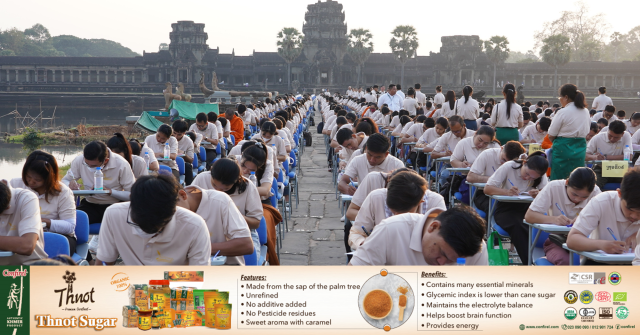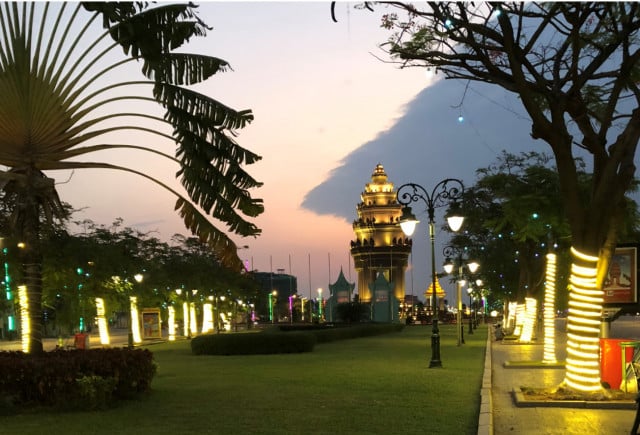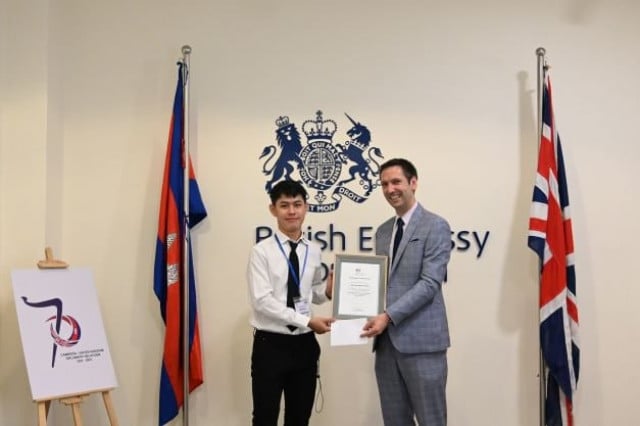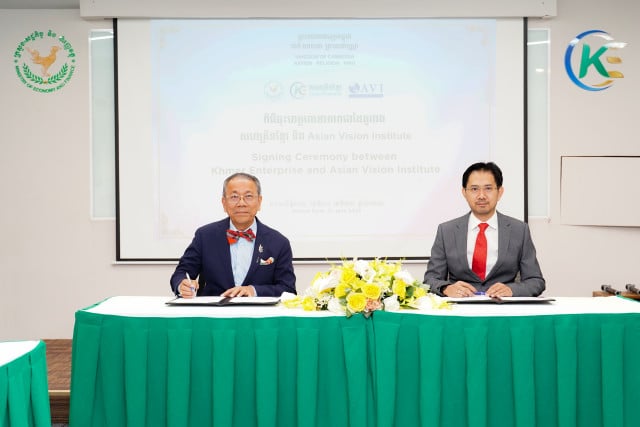Angkor Dictation Competition: From Sunrise to Sunset

- By Ky Chamna
- January 24, 2024 12:00 PM
SIEM REAP — The famed Angkor Wat temple was recently the site of an event conducted for the first time in the country and meant to promote Khmer language literacy among people of all ages. Taking place on its causeway bridge, which was reopened a few months ago following years of restoration work, the "Angkor Dictation" competition was held on Jan. 21, attracting people young and old come to take part or support participants.


On Jan 21, around 700 examinees, 7 to 67 years old, took their seats well before the start of the event scheduled for 7:00 am as onlookers, Cambodian and foreign, observed participants with admiration and curiosity from the front area and from the pontoon bridge of the temple.
As the clock slowly ticked and the sun gradually rose behind one of Angkor Wat’s prominent towers, each stroke of the blue ink started to cover blank pages with words and meaning as Minister of Culture and Fine Arts Phoeurng Sackon read the dictation gently and articulately on the microphone for around 60 minutes.
“Alphabets are the identity of a nation,” the minister said during a short speech before the dictation began. Although our alphabets have changed over time, our people have tried to preserve its existence until the French colonial era when there was a tendency to latinise our alphabets.”
A sense of calmness and focus emanated from the contest area on the causeway throughout the event. Photographers walked slowly behind and between each examinee so as not to create any disturbance while tourists kept their activities to a minimum when walking around the exam areas.

With Angkor Wat’s towers still covered in mist and the morning wind providing comfort, the minister’s voice spread softly as the surrounding bodhi trees flapped their leaves in the breeze.
Participants were told to drop their pens at exactly 10 minutes past 8:00 am as instructors gathered the papers systemically for checking and evaluation that was to take place at a nearby hotel.



As everyone left their seats, journalists from nearly 10 different news outlets, equipped with handheld cameras, smartphones, microphones and enthusiasm, jumped among the participants and surrounding crowd, took photos from all angles and conducted a great number of interviews before people made their way to lunch or a nap before returning for the results to be announced at 4:00 pm that same day.
Among participants in the event was Touch Somony (right), an 11th grade student from Siem Reap city. As he explained, he took part in the event in an effort to improve his Khmer language skills. Although a bit nervous about the result, Somony said that he chose to attend this test not for the award but for the experience.

San Sana (left), a 9th grade student from Siem Reap city, said that what made this event important was that it had reminded all Cambodians to pay attention to the Khmer language and to take it seriously.
At the organisers’ station, a cohort of education experts from the Ministry of Education, Youth and Sports meticulously went through each paper throughout the morning and afternoon, marking and evaluating the answer sheets, and looking for the best and the finest.
Around 3 p.m., not that long before the sun would start fading once more, a growing number of examinees flocked to Angkor Wat’s causeway, sitting in the shade of bodhi trees near the gigantic Hindu monument. Their anticipation, their nervousness and adrenaline could be felt in the air.
Although the weather was still fairly hot, organisers and participants stood firmly on the bridge that has been crossed by kings and dignitaries in distant as well as recent eras.


Cheng Ratana (center) emerged as the winner in the national dictation competition, having misspelled only two words in the test. Van Rida (left) came in second place with three misspelled words, and Youb Sokheak (right) in third position. Phear Kimthuon, a young tour guide who works in the Angkor Archeological Park, was awarded the prize for best handwriting in the competition.

Caption: Phear Kimthuon, a young tour guide who works in the Angkor Archeological Park, was awarded the prize for best handwriting in the competition. Photo provided.
In addition to these winners, several participants with the highest scores after them also received prizes such as hotel coupons and souvenir objects.
Following the announcement of the results, Prime Minister Hun Manet sent a congratulatory message via Telegram to the winners, and urged Cambodian children to embrace and preserve Khmer literature.
The first Angkor Dictation Competition was a collaborative effort between the Ministry of Education, Youth, and Sports, the Ministry of Culture and Fine Arts, the Ministry of Tourism as well as several media outlets, and private entities.


















